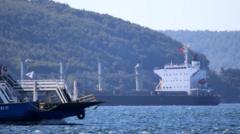Amidst a transformative period in Syrian history, newly appointed President Ahmed al-Shara speaks on strategic alliances, reconstruction efforts, and the need for international cooperation.
**Syria's New Leadership: National Challenges and Future Prospects**

**Syria's New Leadership: National Challenges and Future Prospects**
Former Rebel Leader Ahmed al-Shara Discusses Opportunities and Obstacles Ahead for Syria.
Syria, still shaken from years of civil war, has a new leader at the helm: Ahmed al-Shara, previously a prominent rebel figure associated with a coalition that has removed Bashar al-Assad from power. This paradigm shift in governance presents al-Shara with an array of formidable challenges as he navigates the complexities of rebuilding a devastated nation.
Describing his vision for Syria during a recent interview, al-Shara emphasized the urgent need for international military support, particularly from allies like Russia and Turkey. His administration is keen on initiating discussions that could foster favorable conditions for lifting economic sanctions that have crippled the nation’s economy.
The president, now thrust into a position of power, acknowledged his past associations with radical groups, recognizing the skepticism that may arise from international partners. He expressed his commitment to building trust with Western nations, aiming to reassure them of his reliability.
Al-Shara's government is also faced with the daunting task of establishing functional relationships with neighboring countries that hold significant influence over Syrian affairs, especially Turkey to the north and Israel to the south. His previous role within a rebel faction grants him a unique perspective on the need for reconciliation and stability in the region.
Overall, President al-Shara's leadership marks the beginning of a new chapter for Syria, one that will require not only adept governance but also grassroots efforts to heal a fractured society and restore normalcy after decades of strife.
Describing his vision for Syria during a recent interview, al-Shara emphasized the urgent need for international military support, particularly from allies like Russia and Turkey. His administration is keen on initiating discussions that could foster favorable conditions for lifting economic sanctions that have crippled the nation’s economy.
The president, now thrust into a position of power, acknowledged his past associations with radical groups, recognizing the skepticism that may arise from international partners. He expressed his commitment to building trust with Western nations, aiming to reassure them of his reliability.
Al-Shara's government is also faced with the daunting task of establishing functional relationships with neighboring countries that hold significant influence over Syrian affairs, especially Turkey to the north and Israel to the south. His previous role within a rebel faction grants him a unique perspective on the need for reconciliation and stability in the region.
Overall, President al-Shara's leadership marks the beginning of a new chapter for Syria, one that will require not only adept governance but also grassroots efforts to heal a fractured society and restore normalcy after decades of strife.


















